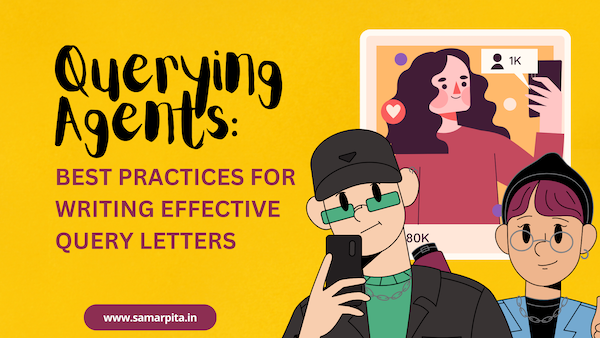Querying agents is an essential step in the traditional publishing process. It involves sending a query letter to literary agents, who will then review the letter and decide whether or not to request a full manuscript. Writing an effective query letter is crucial for success in this process, as it is often the first impression an agent will have of your work. In this blog post, we will explore some best practices for writing effective query letters.
Also Read: Proofreading 101: Catching Errors Before Publication
Research
First and foremost, it is important to research the agents you are querying. This includes reading their submission guidelines and researching their background and experience. By tailoring your query letter to the specific agent, you can demonstrate that you have done your homework and are serious about your writing career.
Query Letter
Next, it is important to keep your query letter concise and focused. A good query letter should be no longer than one page and should include a brief synopsis of your book, a hook to grab the agent’s attention, and information about your qualifications as a writer. The hook is particularly important, as it should be compelling and unique to your story. Avoid generic statements or cliches, and focus on what makes your book stand out.
Also Read: Overcoming Writer’s Block: Advice for Editors
Impress With Your Writing Skill
Another important aspect of a query letter is demonstrating your writing ability. This can be achieved through the tone and voice of your letter, as well as through the synopsis of your book. Make sure that your letter is well-written and free of errors, as this can demonstrate your attention to detail and professionalism.
Include Relevant Information
It is also important to include information about your platform and marketing potential. This can include social media following, previous publications, or any relevant experience in your field. Agents are looking for writers who have the potential to sell books, so demonstrating your marketing potential can be a big selling point.
Also Read: Killing Your Darlings: The Art of Cutting Unnecessary Words
Common Mistakes To Avoid
In addition to these best practices, there are several mistakes to avoid when writing query letters. One common mistake is sending a generic query letter to multiple agents without tailoring it to their specific interests and submission guidelines. This can demonstrate a lack of effort and research on your part, and can turn off potential agents.
Another mistake is being too long-winded or including too much detail in your query letter. Remember, agents are busy and receive a large number of submissions, so they don’t have time to read through lengthy letters. Keep your letter concise and focused on the most important aspects of your book and your qualifications as a writer.
Also Read: Freelance Editing: How to Get Started
Finally, it is important to be patient and persistent in the querying process. It can take weeks or even months to receive a response from agents, and rejection is a common part of the process. However, with persistence and hard work, you can find the right agent for your book and begin the journey to publication.
In Conclusion
Querying agents is a critical step in the traditional publishing process, and writing an effective query letter is key to success in this process. By researching agents, keeping your letter concise and focused, demonstrating your writing ability, highlighting your platform and marketing potential, and avoiding common mistakes, you can increase your chances of success in the querying process. With hard work, patience, and persistence, you can find the right agent for your book and achieve your publishing goals.
This post is part of #BlogchatterA2Z challenge
***
If you are looking for an excellent manuscript editor, someone to create content for your business, or an expert to help build your personal or professional brand on social media, then look no further and connect with me at editor@samarpita.in I can be followed on instagram at @samarpita and on twitter at @samarpitadotin.
***********
Read my ebook WRITE. EDIT. PROMOTE. to learn the basics about becoming an author – from writing your own book, to editing your first draft, and to promoting your book yourself! You can also read my ebook How To Write A Story Effectively and learn some valuable lessons about how a story can go from average to extraordinary. This book is part 1 of the series.
In fiction, I have two short stories for children in an ebook called Bedtime Stories.

